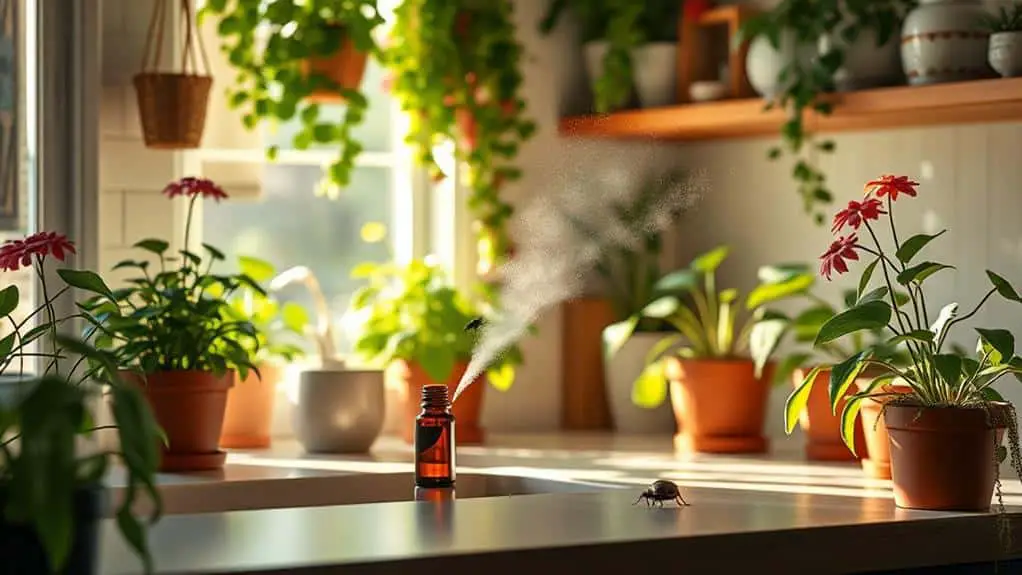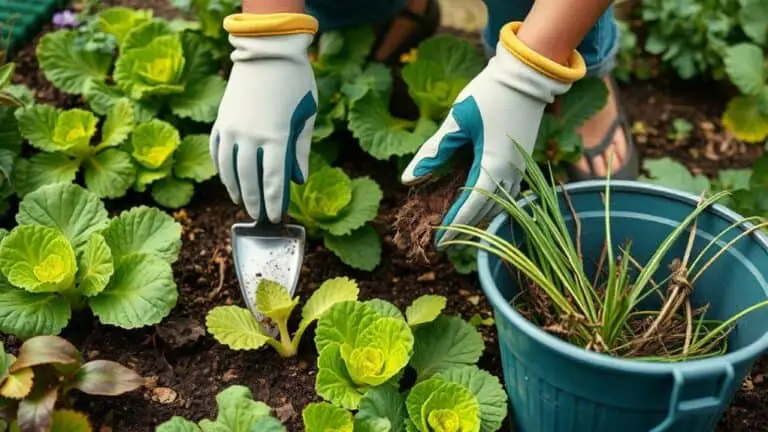Get Rid Of Stink Bugs With This Essential Oil
I've always found stink bugs to be an annoying presence in my home, especially during certain times of the year. If you're like me and prefer natural solutions, essential oils might be the answer. They not only repel these pests but also leave a pleasant aroma behind. But which essential oils work best, and how can you use them effectively? Let me share some insights and tips that have worked for me, ensuring your home stays bug-free without resorting to harsh chemicals. Curious about how to mix and apply these oils for maximum impact?
Understanding Stink Bugs
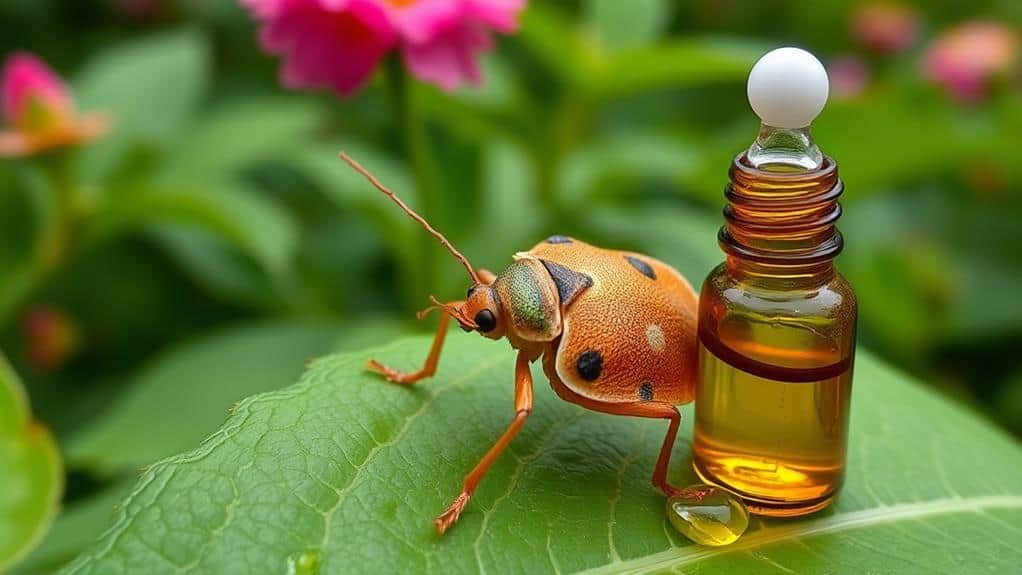
Why should we care about stink bugs? These pests, with their shield-shaped bodies, originally came from East Asia and were identified in the U.S. in the late 1990s.
They mainly feast on fruits and vegetables, damaging crops like apples, pears, and tomatoes. This can really hurt farmers by decreasing the marketability of their produce.
Stink bugs tend to gather indoors during the fall, seeking warmth as temperatures drop. They're attracted to light and certain plants, making homes near farms more prone to infestations.
While they don't bite, they can cause allergic reactions, such as sneezing and nasal blockage. Using essential oils can help prevent stink and keep these bugs away, making life a bit easier for everyone.
Why Essential Oils?
Essential oils are a fantastic choice because they offer a natural and non-toxic way to keep stink bugs at bay, which is safer than using chemical pesticides.
Their strong scents, like clove and lemongrass, naturally repel stink bugs and can be used in sprays, diffusers, or even on cotton balls.
Plus, applying them regularly boosts their effectiveness, making it easier to keep your home stink bug-free.
Natural Repellent Benefits
Many natural solutions exist for repelling pests, but essential oils stand out for their dual benefits of safety and pleasant aromas.
Essential oils are a fantastic choice to repel stink bugs because they're natural repellents that avoid harmful chemicals. The strong scents of clove, spearmint, and lavender are particularly unappealing to stink bugs, keeping them away from your home.
Using essential oils regularly creates a protective barrier around entry points, reducing the chances of an infestation. Plus, they make your space smell lovely!
Essential oils not only minimize chemical exposure but also support an eco-friendly approach to pest control. Consistent use boosts their repellent strength, ensuring your home remains a stink bug-free zone.
Effective Application Methods
Having explored the benefits of natural repellents, let's talk about how to apply essential oils effectively to keep stink bugs at bay.
Essential oils work as stink bug repellents due to their strong scents. For effective application, mix essential oils with water and a bit of dish soap in a spray bottle. Spray this mixture on surfaces where stink bugs are found.
Use diffusers near entry points to create a barrier that keeps stink bugs out. Place cotton balls soaked in essential oils in crevices for continuous repellent action.
Best Essential Oils
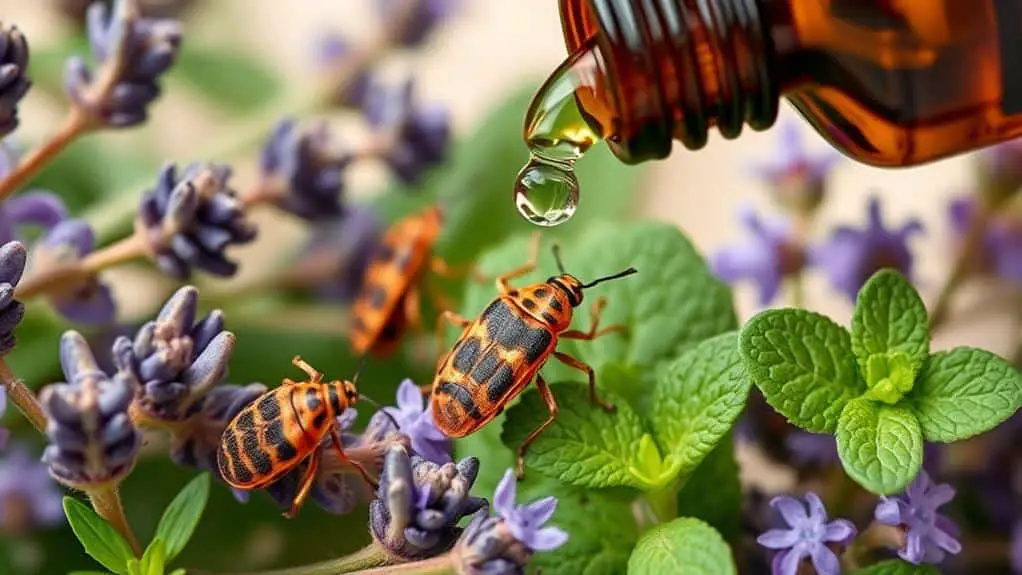
When it comes to repelling stink bugs, a variety of essential oils stand out as highly effective options. Clove oil is one of the best because its strong scent is unpleasant to stink bugs. They simply can't stand it!
Another great choice is spearmint oil. It not only deters these pests but also leaves a revitalizing smell around your home when sprayed near windows and doors.
Lemongrass oil is equally powerful, thanks to its citrus aroma, which stink bugs avoid. Using these oils can make a big difference in keeping your space free of unwanted visitors.
How to Apply
To start applying essential oils to get rid of stink bugs, mix 1/4 teaspoon of oils like rosemary or tea tree with dish soap in a spray bottle, and spray it directly on bugs around windows and doors.
Another effective method is to soak cotton balls in essential oils and place them in crevices or problem areas to keep stink bugs out.
For outdoor protection, spray the essential oil mixture around entry points and garden areas to create a barrier.
Spray Bottle Application
Creating an effective stink bug repellent with essential oils is straightforward and can be done in just a few simple steps.
First, mix 1/4 teaspoon of essential oils like rosemary, thyme, or tea tree with dish soap in a spray bottle filled with water. Shake the spray bottle well to guarantee the essential oils and soap are thoroughly combined before application.
Next, spray the mixture directly on areas where stink bugs are commonly found, such as windows, doors, and other entry points.
Always test the essential oil spray on inconspicuous surfaces first to confirm there's no adverse reaction or damage to the material.
Reapply the essential oil spray every few days, especially during peak stink bug season in spring and fall, for continued effectiveness.
Cotton Ball Placement
Repelling stink bugs with essential oils doesn't just stop at sprays; cotton balls soaked in essential oils like clove, spearmint, or lavender can be incredibly effective too.
To start, soak a few cotton balls in your chosen essential oil. Place these soaked cotton balls in discreet areas around windows, doors, and other entry points to create a barrier against stink bugs.
Be sure to use multiple cotton balls in each area to boost the scent and its repelling properties. Check and refresh them every few weeks since the scent fades over time.
Also, make certain they're out of reach of pets and children to avoid any accidents. This method is simple and keeps those pesky bugs away!
Indoor Strategies
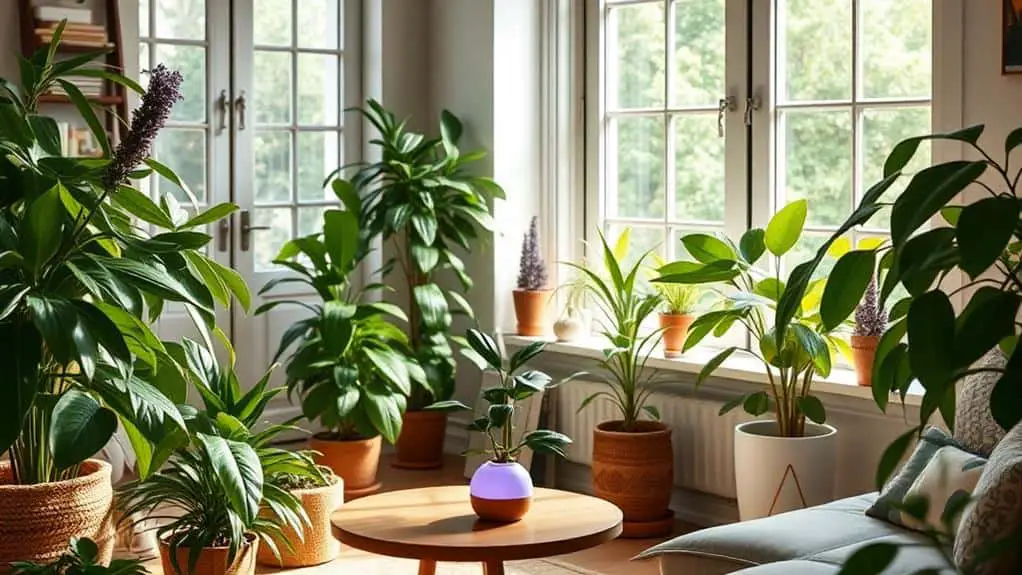
When it comes to keeping stink bugs out of your home, essential oils offer a natural and effective solution. By spraying essential oils like clove, spearmint, and lavender around windows and doors, you can create a strong barrier to repel stink bugs.
I also find that placing cotton balls soaked in these oils in discreet areas helps keep them at bay. For direct pest control, mix essential oils with a bit of dish soap and apply it to any live stink bugs you spot. This combination works wonders!
Outdoor Solutions
For your garden, you can use essential oil sprays to keep stink bugs away by mixing oils like lemongrass, spearmint, and lavender with water in a spray bottle.
Regularly spraying these around entry points and directly on plants during spring and fall creates a barrier that repels these pests.
You can also soak cotton balls in essential oils and place them in your garden to both deter stink bugs and add a pleasant scent to your outdoor space.
Garden Protection Strategies
Protecting your garden from stink bugs requires a proactive approach. First, regularly inspect your plants for stink bug eggs, usually found on the undersides of leaves, and crush them. This prevents infestations from growing.
Companion planting is another effective strategy; include plants like lavender and garlic, which naturally repel stink bugs. Essential oils can also be a great ally. By applying these oils around entry points in your garden, you create a barrier that keeps these pests away.
Additionally, use warm soapy water to spray directly on stink bugs for immediate elimination. Don't forget to keep your garden clean by removing debris and weeds, as these offer hiding spots for stink bugs and their eggs.
Essential Oil Sprays
Creating an essential oil spray is an effective and natural way to keep stink bugs at bay in your outdoor spaces. By mixing essential oils like rosemary, thyme, or tea tree with dish soap, you can create a powerful repellent.
Simply combine 1/4 teaspoon of essential oil per cup of water and spray around entry points and infested areas. This helps deter stink bugs from entering your home. Regularly applying these essential oil sprays during spring and fall maintains a protective barrier.
For extra effectiveness, use diffusers with essential oils near windows and doorways. You can also combine these oils with natural repellents like garlic or diatomaceous earth to enhance your outdoor pest control strategy.
Entry Point Barriers
One effective way to keep stink bugs from invading your home is by establishing entry point barriers. Essential oils are great for this.
You can spray a mixture of spearmint and lavender oils around entry points like windows and doors. This creates a scent barrier that will repel stink bugs.
Clove oil is particularly powerful; applying it to window sills and doorways not only repels but can also eliminate stink bugs that come into contact with it.
Using cotton balls soaked in essential oils near doorways gives you an extra layer of defense.
Don't forget to keep your outdoor area tidy by removing debris and reducing moisture—this complements the essential oils and makes your barrier even more effective.
Combining Methods
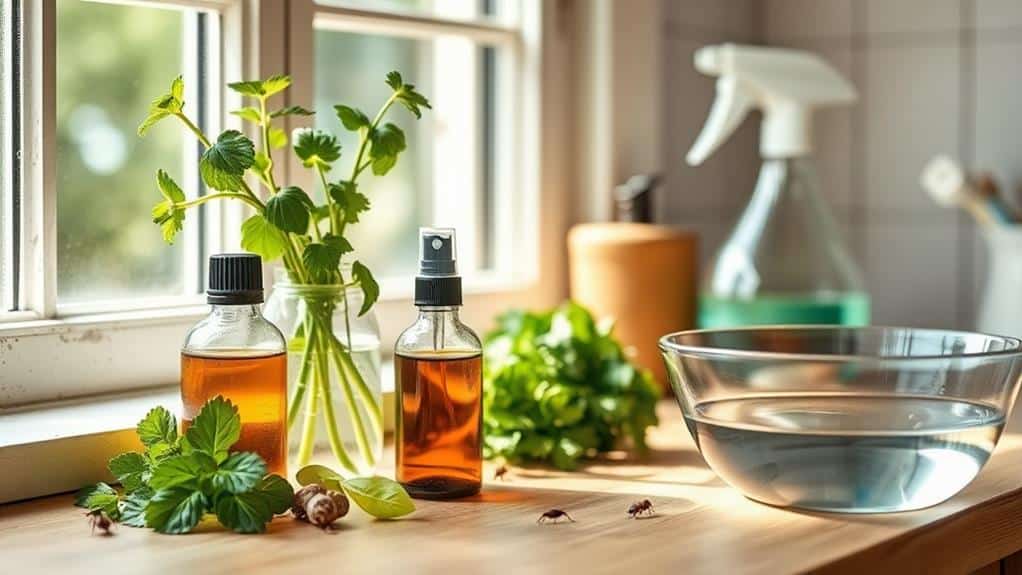
When it comes to warding off stink bugs, combining methods proves to be particularly effective. By using essential oils like clove, spearmint, and lavender, you can enhance their ability to repel stink bugs.
Mixing these oils into a spray solution lets you apply them directly to entry points, ensuring maximum coverage. For an even stronger defense, you can add natural deterrents, such as garlic or crushed cloves.
Regularly reapplying the combined essential oil mixtures during peak seasons—especially in spring and fall—maintains their effectiveness in keeping stink bugs away.
Additionally, monitoring and adjusting the combination based on how the pests behave can fine-tune your strategy. This multifaceted approach can really help in keeping stink bugs out of your home.
Common Mistakes
While combining essential oils with other natural deterrents forms an effective strategy against stink bugs, it's important to avoid common pitfalls that can undermine your efforts.
One mistake isn't testing essential oils on inconspicuous surfaces first, which can damage or discolor furniture and fabrics. Also, failing to reapply essential oils regularly reduces their effectiveness, especially in peak seasons.
Remember to seal the gaps around windows and doors before applying oils; otherwise, stink bugs will find their way back inside.
Don't overlook the power of combining oils with garlic or cloves.
Safety Tips
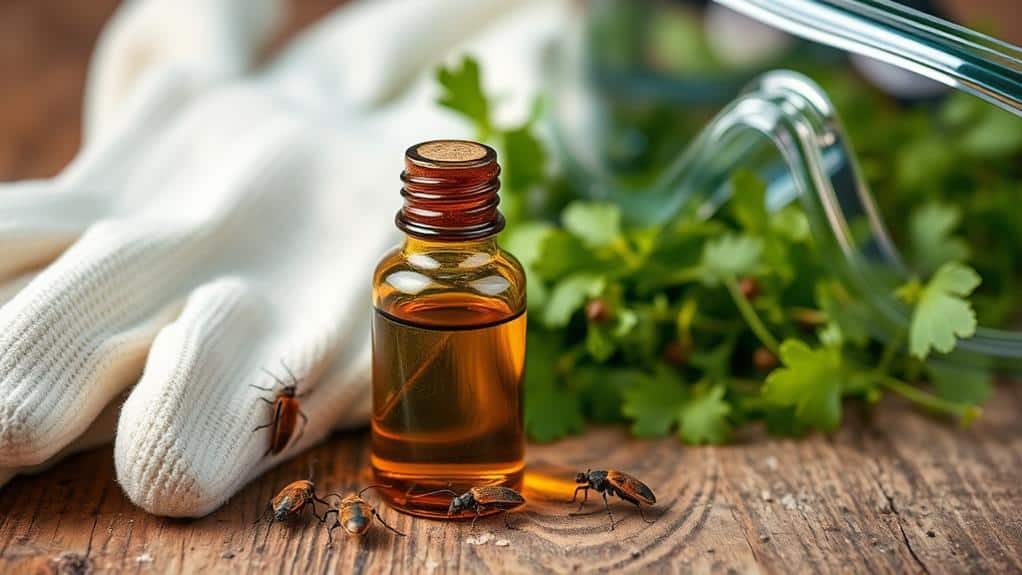
To guarantee your home remains stink bug-free without compromising safety, it's essential to follow some important oil safety tips. First, always test essential oils on a small, hidden area before applying them widely. This helps prevent damage or discoloration. Make certain to keep these oils out of reach of kids and pets to avoid any accidental ingestion. Proper ventilation is critical when using essential oils to prevent respiratory irritation. Additionally, dilute essential oils with water or a carrier oil to reduce the risk of skin irritation. Finally, store your oils in a cool, dark place to maintain their effectiveness.
| Safety Tip | Why It's Important | Action Step |
|---|---|---|
| Test on small area | Avoids damage or discoloration | Apply to hidden spot first |
| Keep out of reach | Prevents accidental ingestion | Store away from kids and pets |
| Make certain ventilation | Reduces respiratory irritation from scents | Open windows or use fans |
Following these safety tips guarantees you can enjoy a stink bug-free home safely and effectively.
Long-Term Prevention
After ensuring we use essential oils safely, let's focus on preventing stink bugs from becoming a recurring problem.
Long-term prevention is key to keeping these pests at bay. Here are some practical steps to achieve that:
- Regularly inspect your home for cracks, gaps, and entry points, and seal them with caulk or weather stripping.
- Diffuse or spray essential oils like clove, spearmint, and lavender around windows and doors to create a lasting barrier.
- Store food in airtight containers and promptly remove any potential attractants, such as fruit left on counters.
- Plant strong-smelling plants, such as garlic and lavender, outside to naturally deter stink bugs.
- Install screens on windows and doors, and keep outdoor lights off at night to reduce attraction.
Frequently Asked Questions
What Essential Oil Kills Stink Bugs?
I've discovered that clove oil's essential oil properties make it highly effective for natural pest control. It not only kills stink bugs but also repels them. Understanding stink bug behavior helps maximize its effectiveness in your home.
How Do You Make Essential Oil Stink Bug Repellent?
To make an effective stink bug repellent, I mix 1/4 teaspoon of essential oil blends like clove or lavender with water and dish soap. These natural ingredients boost repellent effectiveness, ensuring stink bugs stay away from my home.
What Smell Keeps Stink Bugs Away?
From my experience, natural repellents like clove, lemongrass, and spearmint work wonders for pest control. These scents keep stink bugs away. For effective garden tips, try using essential oils or aromatic plants like lavender and garlic.
How Do You Make Homemade Stink Bug Killer?
To make a homemade stink bug killer, I mix natural ingredients like rosemary, thyme, or tea tree essential oils with dish soap and water. This DIY solution effectively eliminates stink bugs when sprayed directly on them.
Conclusion
So, give these essential oils a try for a natural way to keep stink bugs at bay. With clove, spearmint, and lemongrass, you can protect your home without harsh chemicals. Just mix them with water and dish soap, and spray around your windows and doors. Remember to reapply regularly, especially during peak seasons. You'll not only keep stink bugs out but also enjoy a pleasant aroma. You've got this—happy gardening!

